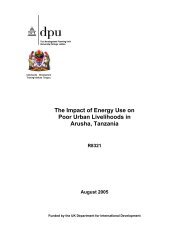EPA Review Annex Documents - DFID
EPA Review Annex Documents - DFID
EPA Review Annex Documents - DFID
You also want an ePaper? Increase the reach of your titles
YUMPU automatically turns print PDFs into web optimized ePapers that Google loves.
objective of regional integration in order to harmonise policies are exempt. However, it is not<br />
clear if FTAs signed between ACP regions are covered by the clause or agreements signed<br />
with other non ACP LDC’s. Lui and Bilal suggest that, if these agreements are notified under<br />
the enabling clause, the MFN clause might not apply. However, it is unclear why this will be<br />
the case, since there are not clear provisions even at the WTO level.<br />
It has to be considered however, that the implementation or trigger of the MFN clause should<br />
be clarified in the agreements and have some flexibility and clarification. It is not clear if the<br />
MFN clause will apply in the general level of exclusions on a product by product basis. For<br />
example, a FTA that liberalises less than the liberalisation on <strong>EPA</strong>, could be still affected by<br />
the MFN clause if some products are liberalised in this FTA but not on the <strong>EPA</strong>s. If this<br />
second interpretation prevails, the distortions that the exclusions could have placed on <strong>EPA</strong>s<br />
will be maintained and enhanced if future FTAs are signed, since these products will be<br />
permanently excluded.<br />
Because the interim <strong>EPA</strong>s are not very clear in terms on when and how the MFN clause will<br />
apply and these provisions have entered, in some cases, in the rendez-vous clause, there is<br />
some possibility of introducing some exceptions. For example, if an ACP region signs an<br />
agreement with another developing or LDC, under the enabling clause, these agreements<br />
should be exempt of the MFN clause. This will help to boost the South-South integration.<br />
From another perspective, it should be clear that any FTA between ACP regions that signed<br />
<strong>EPA</strong> should be exempt of the MFN clause.<br />
Moreover, if an ACP country signs a broader agreement with another developed country that<br />
includes provisions not present in the current <strong>EPA</strong>s, the ACP country should receive some<br />
flexibility in the application of the MFN clause. For example, if a developed country agreed to<br />
include provisions for temporary movement of labour (not present in the current <strong>EPA</strong>) that<br />
the ACP country finds beneficial to them, the MFN clause should not be applied or some<br />
flexibility should be granted (10% less of exclusions in the FTA with the developed country<br />
could be allowed in this case).<br />
Finally, if the ACP region signs an FTA with a non-developed major trading partner, a twostage<br />
MFN clause could be considered. In this case, the MFN clause will not be automatic<br />
but a process of consultations could be opened between the EU and the ACP region. In the<br />
consultation, the EU should analyse and justify effectively if it is being discriminated based<br />
on their level of exports and the importance of the third country as supplier of that product<br />
(competition between the EU and that third country).<br />
All these potential flexibilities could make a substantial difference in terms of the prospects of<br />
South-South integration of ACP countries, and could boost world trade and could have the<br />
key for the potential lock that the MFN clause is imposing on future integration prospects.<br />
However, it should be noted that the MFN clause could eventually be beneficial for ACP<br />
countries. If the development effects of trade liberalisation are important, the MFN clause<br />
could make ACP countries more efficient by eliminating the restrictions and exclusions,<br />
currently in place in the <strong>EPA</strong>s when they sign an FTA with third countries. Nevertheless, the<br />
MFN clause could impede the signing of FTA and possibly harm the integration and<br />
development perspectives.<br />
3. Export taxes<br />
Despite the fact that export taxes are less common than import duties, they exist in some<br />
ACP countries and they seem to have been a concern for those countries during<br />
negotiations. The reasons why countries apply export taxes (or export restrictions as well)<br />
can be varied. They can be used as an efficient and simple way of raising government<br />
revenues, increase value added on exports (if the rate applied on the raw material is higher<br />
203
















